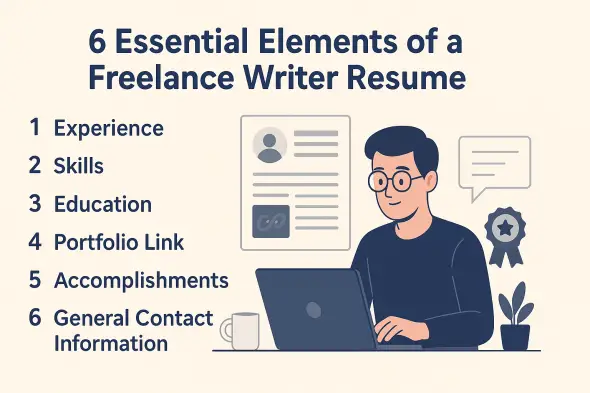The freelance economy continues its massive expansion, positioning freelance writing as a powerful and essential career path. Numbers don’t lie—there are approximately 76.4 million freelancers in the US in 2025, projected to reach 86.5 million by 2027. Freelancers represent about 37% of the US workforce currently, and this number is expected to go over 50% by 2027.
Digital marketing companies are seeking fresh content for a wide variety of clientele. Individual businesses require copywriting for various aspects of their marketing strategy. There isn’t a niche or market out there that doesn’t need content written.
If you’re looking to make a career shift to become a freelance writer, or you are looking to increase your chances of landing new gigs, you might want to beef up your freelance writer resume. While some agencies do not ask for resumes— quite common for freelance writers—it is always best to be ready for when you are asked for one.
What should be in your resume? Here are six essential elements of a freelance copywriter’s resume.
What your freelance writing resume should include

1. Experience
First and foremost, a company will want to see what experience you have. Your experience can be a crucial element of your resume that sets you apart from the competition.
Many copywriters, however, don’t start out having experience in the field. They get the job through experience within a specific niche or industry.
For example, a personal trainer who used to work at a gym could be qualified to write on topics of health, fitness, or nutrition. Someone who worked as a salesperson may have great insight to share on articles that focus on B2C or B2B sales tactics.
Take Cory Smith, a writer based out of Santa Barbara, California. Before he was a writer, he got his start as an elite runner and rock climber. He used his previous knowledge to branch out into freelance writing for various publications such as Outside Magazine and Footwear News.
Of course, having some background in writing will give you more of an edge. A great piece of advice that still holds true is to write your resume for the job you’re applying for. While you may not have a lot of experience in writing, you’re applying for a freelance writing position.
Think about your previous jobs and how writing may have played an integral part in your job responsibilities.
Find ways to incorporate any writing you may have done into the descriptions of your work experience. This could include writing for the company’s website, social media accounts, or even formal writing through contracts or emails.
2. Skills
It’s recommended to include at least 10 skills within your resume. They should be relevant to the position and should include resume keywords. These are words or phrases that describe the abilities and skillset an employer is looking for in relation to the job advertised.
When you apply for a freelance writing job on LinkedIn and see there have been over 300 applicants, this is where keywords can give you a leg up from the competition. (It is highly recommended to apply for jobs that have fewer applicants, however.)
Many companies with high application rates often use software to select resumes that include specific resume keywords. This will automatically filter out any applicants that don’t fit their requirements.
You can discover what these keywords are by comparing the job post to other similar listings. See what verbs and adjectives they have in common.
You’ll quickly notice an overlap with certain words and phrases, which you may want to include in your own resume.
Then there are the soft skills. These are the traits that identify how you interact effectively in the workplace. Words like “collaboration” or “perceptiveness” can be incorporated into both your hard writing skills as well as cohesively flowing into the culture at work.
Let’s take a look at an example of a job description for a content writer for a digital marketing company. In the job description, they may include:
Qualifications:
- Microsoft Office
- Google Analytics
- APA and MLA Formatting
- Keyword Research Platform such as MOZ or SEMRush
This is where you can detail your skills to match the job description based on your skillset. If you fail to mention specifics included by the employer, you could automatically be disqualified as a potential candidate.
3. Education
Include only relevant educational background. Any education you have that goes beyond your high school diploma, such as receiving your associate’s, bachelor’s, or even completing online degrees, should always be added to your resume.
As stated before, some people don’t have previous writing experience. Before you begin applying for copywriting jobs, you might want to take a class or two.
There are hundreds of free online courses available to improve your copywriting skills. This can help flesh out your resume to fit the criteria for the position. Plus, it shows the employer that you’re always willing to learn more and improve your skills.
Google, for example, offers career certifications in various aspects that are relevant to writers. Their digital marketing courses teach users more about keyword research, social media content, and even ad copy. All of which are opportunities for writers to enhance their education.
Hubspot is another great resource for free courses for writers. They have an entire section of coursework dedicated to blogging. Everything from WordPress training to content marketing certification is available through their website.
4. Portfolio Link
Those in search of freelance writers will usually want to see work samples. This is often what prospective clients want to see. Your resume should always include a link to your portfolio.
The best way to do this is by creating a copywriting website. You can showcase some of your best work, where you’ve been featured, and relevant blog posts. Portfolios can also consist of social media copy, digital advertisements, email campaigns, or even product copy.
Keep your portfolio fresh and timely. Unless an older piece of writing was recognized with an award, you should keep them within the last two to three years, maximum.
Don’t oversaturate your portfolio either. List about 10 samples, but no more than twenty. Samples should be relevant to the position you’re applying for. If they’re looking for someone to focus on technology, for example, provide samples in your portfolio that would fit.
Ann Friedman is an excellent example of displaying a portfolio on a writer’s website. As a freelance journalist, she’s written content for major publications such as The New York Times and Elle Magazine. She includes a section of her website dedicated to relevant publications in various categories, including anthologies, essays, interviews, and more.
5. Accomplishments
Accomplishments aren’t always necessary, but they can’t hurt as long as they’re relevant to the position. Your resume is your one opportunity to brag about the hard work you’ve done over the years to develop your career.
Listing your accomplishments should also be timely.
An award you won in high school isn’t the same as having a published article recognized within the last year. Receiving employee of the month from a job you had in college won’t have the same impact as if you received it at your previous corporate job.
Jill Schildhouse uses her website as a portfolio to display some of her most notable awards over the last several years. These eight mentions on her site include awards while others are honorable mentions from highly notable publications from around the country.
However, her website mentions these awards and recognitions are from 2012 and 2013. Because these are over a decade old, it may not be worth mentioning every single one on your resume. But since they’re from her professional career, it might be best to only select the top two or three to mention rather than all eight of them.
6. General Contact Information
It might sound simple, but it can be easy to forget your basic contact details. If the company decides to bring you on board, they’re going to need to get in touch. Make sure to include:
- Your full name
- Phone number
- Email address
- City and state
Increase your chances of landing new gigs with a brilliant resume
Becoming a freelance writer doesn’t happen overnight. It takes time and patience to build your credentials. However, it all starts with how you present yourself on paper.
Resumes are still relevant to freelance writers, regardless of the path you choose to take. Companies big and small will want to learn more about your qualifications if they intend to hire you.
Most importantly, before you begin sending out your resume to potential employers, get a second opinion. Find someone you trust to look it over with a fresh set of eyes. They may be able to provide helpful insight from an outsider’s perspective.


Leave a Reply